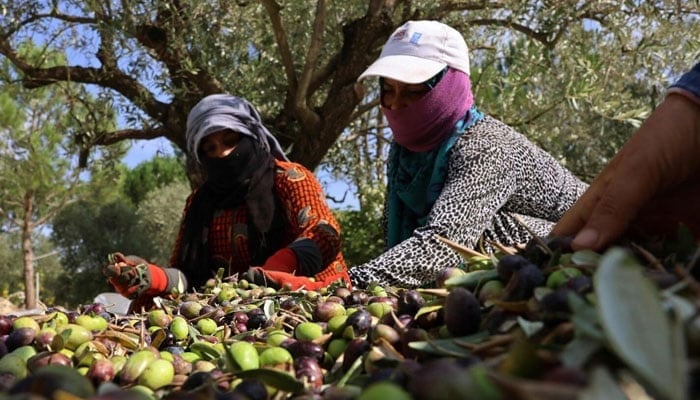Olive farming potential in Pakistan highlighted
Islamabad: Pakistan can become self-sufficient in edible oil within a decade if the immense potential of olive farming and millions of wild olive trees across Pakistan is realised. If harnessed to its full potential, indigenous olive oil production in the country can help save a staggering $4.5 billion spent annually on importing edible oil and lead to a thriving olive export market.
This was observed during a discussion at the Institute of Policy Studies (IPS), Islamabad, organised to shed light on Pakistan’s expanding potential in olive cultivation.
The discussion, moderated by Naufil Shahrukh, GM Operations, IPS, was addressed by Khalid Rahman, chairman, IPS, Dr Faiyaz Alam, general secretary Dua Foundation, Shabbir Soomro, author and journalist, and Dr Ghufran Saeed, Assistant Professor, Department of Food Science and Technology, University of Karachi.
Dr Faiyaz Alam and Shabbir Soomro have also recently co-authored a book on the history, status and potential of olive farming in Pakistan.
While introducing the work, -Pakistan Main Zaitooon Ki Kashat - Tareekh, Tajurbat, Aur Imkanaat, Soomro highlighted that despite Pakistan having around 85 million wild olive trees, their full potential remains unexplored even by local people due to a lack of awareness and knowledge about the resource. The book, the culmination of extensive research, interviews, and expertise, addresses this gap in understanding and aims to bridge the awareness deficit that has hindered the exploration of this rich resource. He said that with an emphasis on nationwide awareness, the book endeavors to enlighten readers about the immense possibilities and benefits hidden within Pakistan’s olive trees. Dr Faiyaz Alam emphasised the transformative impact of arid agriculture.
-
 Royal Family's Approach To Deal With Andrew Finally Revealed
Royal Family's Approach To Deal With Andrew Finally Revealed -
 Super Bowl Weekend Deals Blow To 'Melania' Documentary's Box Office
Super Bowl Weekend Deals Blow To 'Melania' Documentary's Box Office -
 Meghan Markle Shares Glitzy Clips From Fifteen Percent Pledge Gala
Meghan Markle Shares Glitzy Clips From Fifteen Percent Pledge Gala -
 Melissa Jon Hart Explains Rare Reason Behind Not Revisting Old Roles
Melissa Jon Hart Explains Rare Reason Behind Not Revisting Old Roles -
 Meghan Markle Eyeing On ‘Queen’ As Ultimate Goal
Meghan Markle Eyeing On ‘Queen’ As Ultimate Goal -
 Japan Elects Takaichi As First Woman Prime Minister After Sweeping Vote
Japan Elects Takaichi As First Woman Prime Minister After Sweeping Vote -
 Kate Middleton Insists She Would Never Undermine Queen Camilla
Kate Middleton Insists She Would Never Undermine Queen Camilla -
 King Charles 'terrified' Andrew's Scandal Will End His Reign
King Charles 'terrified' Andrew's Scandal Will End His Reign -
 Winter Olympics 2026: Lindsey Vonn’s Olympic Comeback Ends In Devastating Downhill Crash
Winter Olympics 2026: Lindsey Vonn’s Olympic Comeback Ends In Devastating Downhill Crash -
 Adrien Brody Opens Up About His Football Fandom Amid '2026 Super Bowl'
Adrien Brody Opens Up About His Football Fandom Amid '2026 Super Bowl' -
 Barbra Streisand's Obsession With Cloning Revealed
Barbra Streisand's Obsession With Cloning Revealed -
 What Did Olivia Colman Tell Her Husband About Her Gender?
What Did Olivia Colman Tell Her Husband About Her Gender? -
 'We Were Deceived': Noam Chomsky's Wife Regrets Epstein Association
'We Were Deceived': Noam Chomsky's Wife Regrets Epstein Association -
 Patriots' WAGs Slam Cardi B Amid Plans For Super Bowl Party: She Is 'attention-seeker'
Patriots' WAGs Slam Cardi B Amid Plans For Super Bowl Party: She Is 'attention-seeker' -
 Martha Stewart On Surviving Rigorous Times Amid Upcoming Memoir Release
Martha Stewart On Surviving Rigorous Times Amid Upcoming Memoir Release -
 Prince Harry Seen As Crucial To Monarchy’s Future Amid Andrew, Fergie Scandal
Prince Harry Seen As Crucial To Monarchy’s Future Amid Andrew, Fergie Scandal




